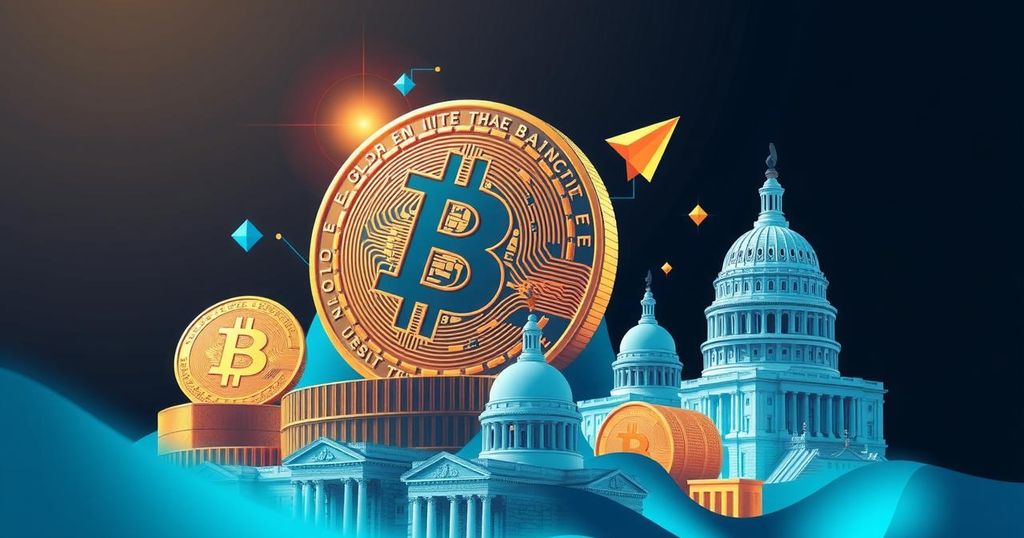Impending U.S. Decision on Strategic Bitcoin Reserve Could Transform BTC Landscape
The U.S. government is nearing a significant deadline regarding the establishment of a strategic Bitcoin reserve by May 15, 2025. This reserve could alter Bitcoin’s role and price dramatically, positioning it as a national asset rather than merely a speculative investment. Analysts foresee possible institutional buy-in and a reduced supply of Bitcoin in the market if the initiative proceeds.
As the U.S. government approaches a significant deadline, attention centers around the potential establishment of a strategic Bitcoin reserve. This initiative, initially considered unconventional, is gaining traction among federal policymakers. If formalised, it could have a substantial influence on the price of Bitcoin, along with its legitimacy and influence in the global financial landscape.
The proposed strategic Bitcoin reserve is comparable to the U.S. Strategic Petroleum Reserve, which serves to safeguard economic stability and national security through controlled oil storage. A strategic Bitcoin reserve could act similarly, providing a hedge against the devaluation of fiat currencies, implementing sanctions globally, or mitigating unexpected market fluctuations. Historically, the government has held crypto from criminal seizures but hasn’t retained Bitcoin as a monetary asset for national interest until now.
A looming deadline, May 15, 2025, is set for the Treasury to submit recommendations on a framework for digital asset reserves, following directives from the Biden administration. However, with President Trump’s administration taking a more proactive approach towards assets and digital sovereignty, the conversation is gaining urgency. The implications are substantial: if Bitcoin receives designation as a strategic asset, the government might not only halt the public auction of seized BTC but also start acquiring Bitcoin directly through over-the-counter (OTC) purchases or mining agreements.
This policy could spark international competition among central banks eager to establish Bitcoin holdings. Currently trading around $94,000, Bitcoin prices are buoyed by factors like institutional demand, supply constraints due to the upcoming halving, and record ETF inflows. A government endorsement as a strategic asset could lead to a dramatic supply squeeze.
Analysts predict several outcomes if that happens. Firstly, institutional investors, including sovereign funds and hedge funds, might pile in, fearing they’ll miss out on Bitcoin’s potential rally. Secondly, limited supply could occur as the government pulls BTC off the market. Lastly, Bitcoin’s status could evolve; it wouldn’t just be viewed as a value store but elevate to a sovereign-grade reserve asset, akin to gold. According to veteran analyst Dylan LeClair, such a move could decisively shift perspectives about Bitcoin.
In recent months, various factors have prompted this contemplation, including the booming success of spot Bitcoin ETFs amassing over $60 billion in inflows since January, alongside increasing geopolitical unrest and movements towards central bank de-dollarisation. Trump’s focus on economic independence and hard assets has further propelled the discussion.
If the U.S. moves forward with a strategic reserve, it’s likely to exert influence on other countries, particularly China, Russia, and EU states, urging them to consider similar actions to maintain monetary flexibility. Meanwhile, El Salvador, recognised as a pioneer for adopting Bitcoin as legal tender in 2021, has already gained significantly from its Bitcoin reserves. The U.S. taking a similar route would carry immense weight in the global finance arena, potentially influencing other G7 nations as well.
In summary, the U.S. is grappling with a pivotal decision that could alter Bitcoin’s landscape entirely—from a speculative venture to a legitimate hedge for sovereign states. Investors should pay close attention; it might just be history unfolding before our eyes.




Post Comment